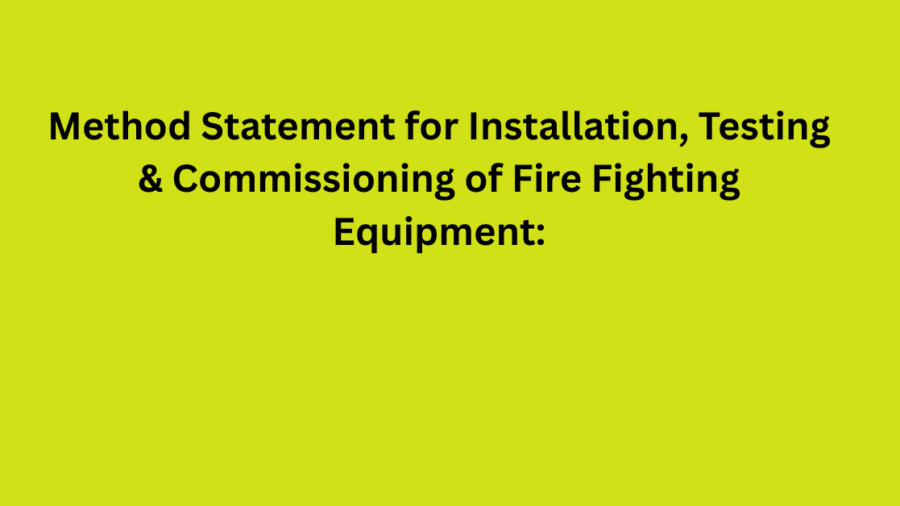Equipment Covered:
- Fire Hose Reels
- Fire Hose Cabinets
- Fire Extinguishers
📌 1. Purpose
This document outlines the procedures for the installation, testing, and commissioning of firefighting equipment as per project specifications, approved shop drawings, and safety standards.
📦 2. Scope
Covers the complete lifecycle of firefighting equipment, including:
- Supply
- Installation
- Testing
- Commissioning
All activities shall comply with the manufacturer’s guidelines and project-specific technical documents.
📚 3. References
- ISO 9001:2008
- Project Quality Plan (PQP)
- Project HSE Plan
- Latest approved shop drawings
- Manufacturer’s manuals and material submittals
📖 4. Abbreviations
- PQP: Project Quality Plan
- HSE: Health, Safety & Environment
- QA/QC: Quality Assurance / Quality Control
- ITP: Inspection & Test Plan
- MIR/WIR: Material/Work Inspection Request
- UPVC / HDPE / PEX / G.I. Pipes: Pipe materials used in FF systems
👷 5. Responsibilities
👨💼 Project Manager
- Ensure timely progress and material availability
- Maintain quality and safety in coordination with QA/QC & HSE
🏗️ Construction Manager
- Supervise worksite activities
- Coordinate inspections and approvals
🧑💻 Site Engineer
- Implement approved method statements
- Monitor progress and coordinate inspections
🛠️ QA/QC Engineer
- Ensure compliance with drawings/specifications
- Raise MIRs/WIRs and conduct required tests
🧰 Site Foreman
- Oversee daily tasks and distribute resources
- Report progress and issues
🦺 HSE Officer
- Enforce safety protocols
- Conduct safety briefings and ensure proper PPE use
🗃️ Store Keeper
- Manage delivery and storage of firefighting materials
- Coordinate with QA/QC for material verification
🛠️ 6. Tools & Equipment
- Tool Box & Measuring Tape
- Electric Drill & Threading Machine
- Pipe Cutting & Grinding Machines
- Torque Wrench & Pressure Gauge
- Mobile Scaffold & Staging Platforms
- Safety PPE, Warning Signboards
🚧 7. Installation Procedure
✅ 7.1 General Requirements
- All equipment must be inspected via MIR prior to installation
- Qualified personnel must perform tasks per approved drawings
🚛 7.2 Delivery & Transport
- Equipment should arrive in proper packaging
- Handle with care to avoid scratches or dents
🏠 7.3 Storage
- Store in dry, protected areas
- Keep items in original packaging until needed
🔩 7.4 Installation Sequence
⚠️ Safety First
- Conduct toolbox talks
- Use PPE and follow site-specific HSE rules
- Display caution signage during works
🔧 Pre-Installation Checklist
- Verify civil clearance and approved shop drawings
- Ensure no clashes with other services
- Access areas must be cleared and safe
🧯 Fire Hose Reel & Cabinet Installation
- Confirm manufacturer’s specs and accessories
- Mark mounting points precisely
- Install with supports (steel brackets if needed)
- Connect piping and verify valve accessibility
- Conduct inspections via WIR after installation
🧨 Fire Extinguisher Installation
- Follow approved locations on shop drawings
- Install mounting brackets correctly
- Use appropriate extinguisher types (e.g., Dry Powder, CO2)
- Raise inspection request for consultant approval
✅ 7.5 Testing & Commissioning
🔍 Visual Inspection
- Inspect hoses, nozzles, and piping
- Ensure full reach, no tears, proper rewind
🧪 Testing Process
- Operate hose reels for smooth extension and rewind
- Check valve leaks (≤5ml in 5 minutes)
- Ensure minimum flow rate (≥0.33 L/sec)
⚙️ Commissioning – Fire Hose Equipment
- Verify hose racks swing and hose extends freely
- Confirm nozzle functions properly
- Ensure cabinet is accessible, locks function, glazing intact
🧯 Commissioning – Fire Extinguishers
- Inspect safety pins, pressure, and hoses
- Test spray into a safe location
- Replace seals and log inspection results
📎 8. Attachments
- ✅ Inspection & Test Plan (ITP)
- 📋 Installation Checklist
- 🧪 Testing & Commissioning Checklist
- ⚠️ Risk Assessment Report

Add a Comment